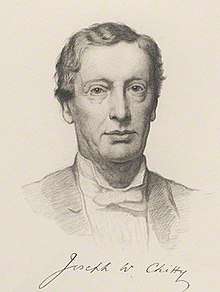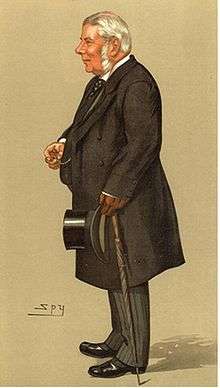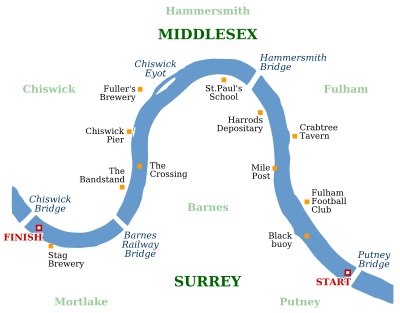The Boat Race 1852
The 11th Boat Race took place on the River Thames on 3 April 1852. Typically held annually, the event is a side-by-side rowing race between crews from the Universities of Oxford and Cambridge. Former Cambridge cox Thomas Selby Egan coached Oxford, the first time that either crew had been trained by a member of the opposing university. The race was won by Oxford, their first Boat Race victory at Easter, who triumphed over Cambridge by nine lengths.
| 11th Boat Race | |||
|---|---|---|---|
| Date | 3 April 1852 | ||
| Winner | Oxford | ||
| Margin of victory | 9 lengths | ||
| Winning time | 21 minutes 36 seconds | ||
| Overall record (Cambridge–Oxford) | 7–4 | ||
| Umpire | C. J. Selwyn | ||
| |||
Background
The Boat Race is a side-by-side rowing competition between the University of Oxford (sometimes referred to as the "Dark Blues")[1] and the University of Cambridge (sometimes referred to as the "Light Blues").[1] The race was first held in 1829, and since 1845 has taken place on the 4.2-mile (6.8 km) Championship Course on the River Thames in southwest London.[2][3] Oxford went into the race as reigning champions, having defeated Cambridge, who were disqualified, in the previous race held in December 1849. Cambridge led overall with seven wins to Oxford's three.[4]
The universities were unable to agree on a date for race in both 1850 and 1851.[5] The challenge to race from Cambridge was received by Oxford in December 1851 and was finally accepted that a race be conducted around Easter the following year.[6] Oxford were coached by the former Cambridge cox Thomas Selby Egan, who had represented the Light Blues in the 1836, 1839 and 1840 races, in protest at the use of watermen as Boat Race coaches.[7] Oxford had prevented their use since 1841 but Cambridge would not do so until 1873 and were coached by the Thames waterman and world champion sculler Bob Coombes.[8] It was the first time a crew was coached by a member of the other university.[9]
The umpire for the race was Charles Jasper Selwyn and the starter was Edward Searle.[10][11]
Crews
Three members of the Oxford crew had participated in the previous meeting of the universities in December 1849, Houghton, Joseph William Chitty and the cox, Cotton. None of the Cambridge crew had Boat Race experience.[11] The Cambridge crew weighed an average of 11 st 8.5 lb (73.5 kg), 2 pounds (0.9 kg) per rower more than their opponents.[11]


| Seat | Cambridge |
Oxford | ||||
|---|---|---|---|---|---|---|
| Name | College | Weight | Name | College | Weight | |
| Bow | E. Macnaghten | 1st Trinity | 11 st 0 lb | O. K. Prescott | Brasenose | 10 st 0 lb |
| 2 | H. Brandt | 1st Trinity | 11 st 5 lb | R. Greenall (P) | Brasenose | 10 st 12 lb |
| 3 | H. E. Tuckey | Lady Margaret Boat Club | 11 st 3 lb | Philip Henry Nind | Christ Church | 11 st 2 lb |
| 4 | H. B. Foord | 1st Trinity | 12 st 6 lb | Reginald John Buller | Balliol | 12 st 4 lb |
| 5 | E. Hawley | Sidney Sussex | 12 st 5 lb | Henry Denne | University | 12 st 8 lb |
| 6 | W. S. Longmore | Sidney Sussex | 11 st 4 lb | W. Houghton | Brasenose | 11 st 8 lb |
| 7 | W. A. Norris | 3rd Trinity | 11 st 9 lb | W. O. Meade King | Pembroke | 11 st 11 lb |
| Stroke | Frederick Wm. Johnson (P) | 3rd Trinity | 11 st 8 lb | J. W. Chitty | Balliol | 11 st 7 lb |
| Cox | C. H. Crosse | Gonville & Caius | 9 st 7 lb | R. W. Cotton | Christ Church | 9 st 2 lb |
| Source:[11] (P) – boat club president[12] | ||||||
Race

Cambridge won the toss and elected to start on the Surrey side of the river, handing the Middlesex station to Oxford.[9] The race started under Searle's command at 1.45 p.m. with Oxford taking a slight lead. On the approach to Hammersmith Bridge the gap was closing and Oxford passed through the central arch.[13] Cambridge, following Coombe's advice, opted to shoot the bridge towards the Surrey side and in doing so "lost the stream" and allowed Oxford to extend their lead.[8] By Barnes Bridge the lead was around four lengths,[14] and Oxford kept increasing their margin, winning by nine lengths in a time of 21 minutes 36 seconds. It was their second consecutive victory and took the overall record to 7–4 in favour of Cambridge.[4]
References
Footnotes
- "Dark Blues aim to punch above their weight". The Observer. 6 April 2003. Archived from the original on 11 September 2014. Retrieved 1 September 2014.
- Smith, Oliver (25 March 2014). "University Boat Race 2014: spectators' guide". The Daily Telegraph. Archived from the original on 1 July 2014. Retrieved 3 June 2014.
- "The Course". The Boat Race Company Limited. Archived from the original on 28 October 2014. Retrieved 7 November 2014.
- "Boat Race – Results". The Boat Race Company Limited. Archived from the original on 12 July 2016. Retrieved 26 October 2014.
- MacMichael, pp. 168–171
- MacMichael, pp. 176–178
- Halladay, Eric (18 October 1990). Rowing in England: A Social History: the Amateur Debate. Manchester University Press. pp. 45–46. ISBN 978-0719026058.
- "1830–1855". The Boat Race Company Limited. Archived from the original on 5 January 2009. Retrieved 7 November 2014.
- MacMichael, p. 181
- Burnell p. 49
- MacMichael, p. 182
- Burnell pp. 50–51
- MacMichael, p. 183
- MacMichael, p. 184
Sources
- Burnell, Richard (1979). One Hundred and Fifty Years of the Oxford and Cambridge Boat Race. Precision Press. ISBN 978-0-9500638-7-4.
- MacMichael, William Fisher (1870). The Oxford and Cambridge Boat Races: From A.D. 1829 to 1869. Deighton. p. 37.
boat race oxford cambridge.

